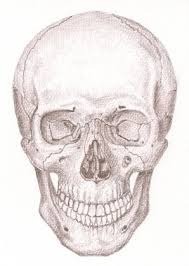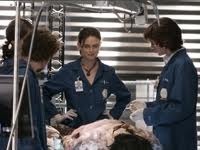The Day Job
I seem to get some of the most interesting responses from people when I explain what I study. It's generally a mix between awe and repulsion :) At any rate, I decided today was a day to post about it, just for fun! Also, because I thought I'd open up the question I posted about here once again--namely, do you have any anthropology/genetics/forensics/archaeology questions you want answered? I'm your woman!
Anyhow, my doctorate is technically in anthropology. Now, the study of humans is generally broken down into two main areas (well, 4, but let's not be all Boasian, okay?)--physical anthropology and socio-cultural anthropology. This can be roughly (and I do mean roughly) divided into studying living people (socio-cultural) and studying dead people & human origins (physical). I'm a molecular anthropologist, which means I study people through looking at their DNA and am firmly in the physical anthro side of things. Namely, I study ancient DNA, or the DNA of people that have died a long time ago. Think, like 1000 years or more. Some much longer, some a few hundred years more current. My dissertation was based on people that lived around 1k years ago though, so that's a pretty rough estimate of what I do.
Have you heard about the sequencing of the Neanderthal genome? That's molecular anthropology. We're cool like that.
 Are you thinking about Jurassic Park yet? That's always the first question I get asked (which generally leads to my long-assed answer as to why that will never happen--I'll spare you :). Anyhow, what I really do basically is tedious and careful, and involves a life-long complex about introducing modern, contaminating DNA into a sample. Basically, archaeologists (which is what I did my undergraduate research in, and spent a few years working as professionally) occasionally dig up dead people. I am not going to get into whether this is right or wrong here--though that's an ongoing argument. Anyhow, they usually send me a tiny piece of the remains, like a tooth or bone. I get the DNA out and compare it to other samples to see what it looks like in comparison to other individuals and other populations. I look at things like migrations, family relationships, social structure, etc. etc. It sounds a lot cooler than it usually ends up being--at least to the outside observer.
Are you thinking about Jurassic Park yet? That's always the first question I get asked (which generally leads to my long-assed answer as to why that will never happen--I'll spare you :). Anyhow, what I really do basically is tedious and careful, and involves a life-long complex about introducing modern, contaminating DNA into a sample. Basically, archaeologists (which is what I did my undergraduate research in, and spent a few years working as professionally) occasionally dig up dead people. I am not going to get into whether this is right or wrong here--though that's an ongoing argument. Anyhow, they usually send me a tiny piece of the remains, like a tooth or bone. I get the DNA out and compare it to other samples to see what it looks like in comparison to other individuals and other populations. I look at things like migrations, family relationships, social structure, etc. etc. It sounds a lot cooler than it usually ends up being--at least to the outside observer.
No matter what, my academic life involves a lot of time in a small room working very carefully with small amounts of clear liquid. It allows me a lot of time to let my mind wander a bit (things can get pretty rote at times--think of loading a tiny drop of the same liquid into 96 little tubes). I love it, oddly, but it also gives me some mental space to think about my stories. And that combo is perfect for me.
 Constance Brennan from BonesEven though, I am regularly told that I remind people of her:
Constance Brennan from BonesEven though, I am regularly told that I remind people of her:
(The random simalarities are kind of disturbing, actually. Bah. I, at least, have better social skills. I hope.)
Someday I will write a story that incorporates my academic life. Someday. And I'll wish I could do half as well as Kathy Reich :) Until then, that's what I do!
Tell me, what about your day job helps you with your writing? Anything? Nothing? Something in between?
Anyhow, my doctorate is technically in anthropology. Now, the study of humans is generally broken down into two main areas (well, 4, but let's not be all Boasian, okay?)--physical anthropology and socio-cultural anthropology. This can be roughly (and I do mean roughly) divided into studying living people (socio-cultural) and studying dead people & human origins (physical). I'm a molecular anthropologist, which means I study people through looking at their DNA and am firmly in the physical anthro side of things. Namely, I study ancient DNA, or the DNA of people that have died a long time ago. Think, like 1000 years or more. Some much longer, some a few hundred years more current. My dissertation was based on people that lived around 1k years ago though, so that's a pretty rough estimate of what I do.
Have you heard about the sequencing of the Neanderthal genome? That's molecular anthropology. We're cool like that.
 Are you thinking about Jurassic Park yet? That's always the first question I get asked (which generally leads to my long-assed answer as to why that will never happen--I'll spare you :). Anyhow, what I really do basically is tedious and careful, and involves a life-long complex about introducing modern, contaminating DNA into a sample. Basically, archaeologists (which is what I did my undergraduate research in, and spent a few years working as professionally) occasionally dig up dead people. I am not going to get into whether this is right or wrong here--though that's an ongoing argument. Anyhow, they usually send me a tiny piece of the remains, like a tooth or bone. I get the DNA out and compare it to other samples to see what it looks like in comparison to other individuals and other populations. I look at things like migrations, family relationships, social structure, etc. etc. It sounds a lot cooler than it usually ends up being--at least to the outside observer.
Are you thinking about Jurassic Park yet? That's always the first question I get asked (which generally leads to my long-assed answer as to why that will never happen--I'll spare you :). Anyhow, what I really do basically is tedious and careful, and involves a life-long complex about introducing modern, contaminating DNA into a sample. Basically, archaeologists (which is what I did my undergraduate research in, and spent a few years working as professionally) occasionally dig up dead people. I am not going to get into whether this is right or wrong here--though that's an ongoing argument. Anyhow, they usually send me a tiny piece of the remains, like a tooth or bone. I get the DNA out and compare it to other samples to see what it looks like in comparison to other individuals and other populations. I look at things like migrations, family relationships, social structure, etc. etc. It sounds a lot cooler than it usually ends up being--at least to the outside observer.No matter what, my academic life involves a lot of time in a small room working very carefully with small amounts of clear liquid. It allows me a lot of time to let my mind wander a bit (things can get pretty rote at times--think of loading a tiny drop of the same liquid into 96 little tubes). I love it, oddly, but it also gives me some mental space to think about my stories. And that combo is perfect for me.
 Constance Brennan from BonesEven though, I am regularly told that I remind people of her:
Constance Brennan from BonesEven though, I am regularly told that I remind people of her:(The random simalarities are kind of disturbing, actually. Bah. I, at least, have better social skills. I hope.)
Someday I will write a story that incorporates my academic life. Someday. And I'll wish I could do half as well as Kathy Reich :) Until then, that's what I do!
Tell me, what about your day job helps you with your writing? Anything? Nothing? Something in between?
Published on February 24, 2012 06:00
No comments have been added yet.



